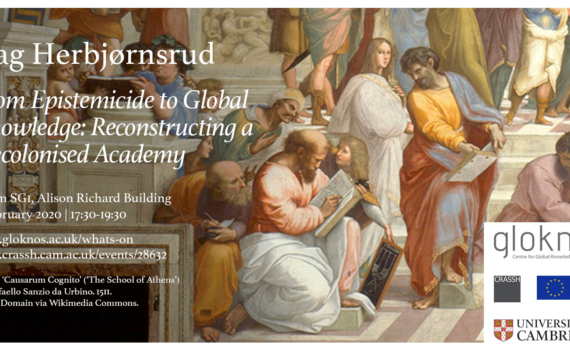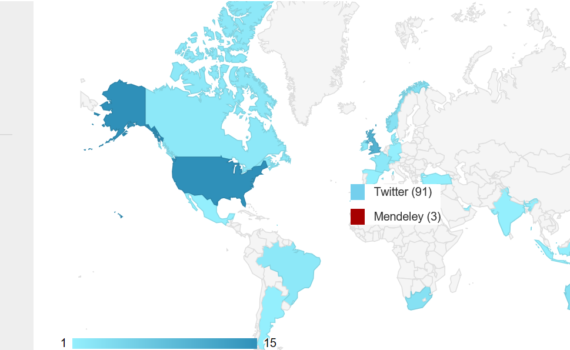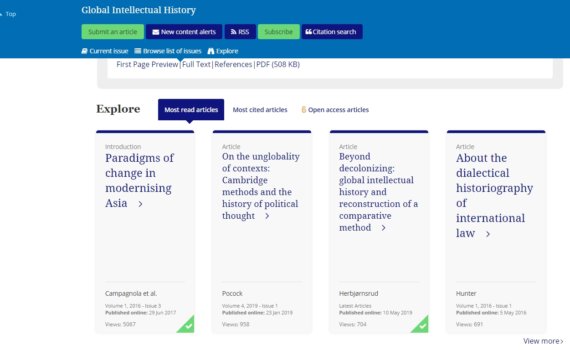The «Global Inequality Project: An Intellectual History» at Aarhus University (Denmark) will host the webinar «Global Intellectual History: Reflections on Methodology and Raison d’être» with the global historian of ideas Dag Herbjørnsrud on March 25 2021, 1:30 pm (GMT+1). «The Global Inequality Project» is led by Assoc. Professor Christian Olaf Christensen at Aarhus University: «An Intellectual History of Global Inequality, 1960-2015 is a qualitative, humanistic research project that applies a […]
Global History of Ideas
On 25 January 2021 the European University Institute (Florence, Italy) held a Reading Group Meeting on «Global Intellectual History», the first 2021 session of the Intellectual History Working Group (IHWG) series, «History in theory, history in use». Two papers are included as suggested readings: Samuel Moyn and Andrew Sartori’s «Approaches to Global Intellectual History» (2013) and the paper «Beyond decolonizing» (in the journal Global Intellectual History, 2019) by Dag Herbjørnsrud. […]
The article «Beyond decolonizing: global intellectual history and reconstruction of a comparative method» by Dag Herbjørnsrud, published in the journal Global Intellectual History (May 10 2019) has, in September 2020, an attention score of 96: «Altmetric has tracked 15,773,921 research outputs across all sources so far. Compared to these this one has done particularly well and is in the 98th percentile: it’s in the top 5% of all research outputs ever […]
As of March 2020, five articles of the global historian of ideas Dag Herbjørnsrud (founder of SGOKI) have been listed at the website of «Pieces on Non-‘Western’ Philosophy: for a General Audience: A List.» This list of texts on philosophy is made by Abiral Chitrakar Phuyal, New York University/Shanghai. LINK. The 5 texts of Herbjørnsrud: General/comparative: ‘First women of philosophy’, Aeon, 23 November, 2018. Africa: ‘The African Enlightenment’, Aeon, 13 December, 2017 Africa: ‘The […]
On the 25th of February 2020, Yale NUS professor Bryan W Van Norden held the lecture «Learning from Chinese Philosophy» at the Intercultural Museum of Oslo (IKM), Norway. Media coverage of the event: Molo (29.02.20), the student journal of history of ideas at the University of Oslo (UiO): «Er mainstream akademisk filosofi rasistisk?» (Is mainstream academic philosophy racist?) Utrop (27.02.20), the multicultural paper of Norway: «– Norge kan lære av […]
On 7 February, 2020, at 5:30 pm, SGOKI founder Dag Herbjørnsrud presented the lecture «From Epistemicide to Global Knowledge: Reconstructing a Decolonised Academy« as part of the annual lecture series at the Centre for Global Knowledge Studies (Gloknos) at the University of Cambridge. Feedback: «Thank you again for the very informative and engaging talk today, an interesting intersection of critical philosophy and historiography.» Kyoo Lee, Professor of Philosophy and Gender […]
CHRONOS Research Theme Launch Event: On February 10 2020, at 5.30 pm, SGOKi founder Dag Herbjørnsrud held the lecture «Intersectional Academy: Deconstructing the Colonial Narratives« at Royal Holloway, University of London. Location: 11 Bedford Square, Bloomsbury, London, UK. The lecture was «Launching our new research theme, Silent Voices«, The Centre for Critical and Historical Research on Organisation and Society (CHRONOS) stated. CHRONOS launched in 2019 as part of the School […]
The journal Cosmopolis – a journal of cosmopolitics (Brussels, Belgium) – which is published twice a year, is planning a special issue on the topic “Decolonizing the Academy” in late 2020. We are looking for articles, papers, and texts that can illuminate the topic. Please send you proposal (a short sketch is enough) to dag@sgoki.org by February 1st, 2020. Final deadline for finished texts: October 15th, 2020. (PHOTO CAPTION: The […]
Podcast: The podcast Seize The Moment (FB-link), by Leon Garber and Alan Ulman, devotes its episode 21 (Sept 15, 2019) to an hour-long conversation with the global historian of ideas, Dag Herbjørnsrud – the founder of SGOKI. The title of the episode is «The Colonization of Intellectual Thought«. Info from the Seize the Moment podcast: «On episode 21, we welcome philosopher Dag Herbjornsrud to learn about the exclusion of marginalized […]
SGOKI founder Dag Herbjørnsrud has published a new article in issue 2019-1-2 of the journal Cosmopolis (located in Brussels, Belgium): «First women of philosophy«. The article covers women philosophers from the Global South, all born before 1800 CE. Examples: Gargi from India, Ban Zhao from China, and Nana Asma’u from today’s Nigeria. Info on Cosmopolis: «Cosmopolis provides every six months a high profile outlet for interdisciplinary scholarship and public debate on […]
More read than 13 million articles: Altmetric is recording high attention for the article «Beyond decolonizing: global intellectual history and reconstruction of a comparative method« by the global historian of ideas Dag Herbjørnsrud (founder of SGOKI). The article was published in the Routledge journal Global Intellectual History on May 10, 2019. Within four weeks, it was listed as number 2 at the journal’s «most read» list; JGA Pocock’s latest article […]
On January 23, 2019, the legendary historian J. G. A. Pocock (b. 1924) published a new article in the Routledge journal Global Intellectual History, «On the unglobality of contexts: Cambridge methods and the history of political thought«. John Greville Agard Pocock, a John Hopkins University professor since 1975, is known as a vital co-founder of the Cambridge School; a historicist or contextualist method of analyzing intellectual history. Pocock’s new text […]
On May 10 2019, the Routledge and Francis & Taylor journal Global Intellectual History published the latest article by the historian of ideas Dag Herbjørnsrud: «Beyond decolonizing: global intellectual history and reconstruction of a comparative method.» In the article, Herbjørnsrud proposes a comparative method to go beyond methodological nationalism and to answer the calls to decolonize the academy. The text covers examples ranging from social anthropology, Mo Zi, and Herodotus […]













